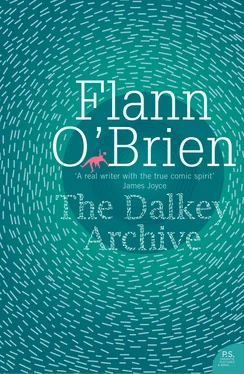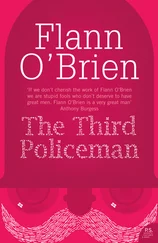As it was at Mick he looked the latter firmly shook his head but thought well to take another stern sup of whiskey. Hackett was frowning. De Selby sat down by the table.
– Consideration of time, he said, from intellectual, philosophic or even mathematical criteria is fatuity, and the pre-occupation of slovens. In such unseemly brawls some priestly fop is bound to induce a sort of cerebral catalepsy by bringing forward terms such as infinity and eternity.
Mick thought it seemly to say something, however foolish.
– If time is illusory as you seem to suggest, Mr De Selby, how is it that when a child is born, with time he grows to be a boy, then a man, next an old man and finally a spent and helpless cripple?
De Selby’s slight smile showed a return of the benign mood.
– There you have another error in formulating thought. You confound time with organic evolution. Take your child who has grown to be a man of twenty-one. His total life-span is to be seventy years. He has a horse whose life-span is to be twenty. He goes for a ride on his horse. Do these two creatures subsist simultaneously in dissimilar conditions of time? Is the velocity of time for the horse three and a half times that for the man?
Hackett was now alert.
– Come here, he said. That greedy fellow the pike is reputed to grow to be up to two hundred years of age. How is our time-ratio if he is caught and killed by a young fellow of fifteen?
– Work it out for yourself, De Selby replied pleasantly. Divergences, incompatibilities, irreconcilables are everywhere. Poor Descartes! He tried to reduce all goings-on in the natural world to a code of mechanics, kinetic but not dynamic. All motion of objects was circular, he denied a vacuum was possible and affirmed that weight existed irrespective of gravity. Cogito ergo sum ? He might as well have written inepsias scripsi ergo sum and prove the same point, as he thought.
– That man’s work, Mick interjected, may have been mistaken in some conclusions but was guided by his absolute belief in Almighty God.
– True indeed. I personally don’t discount the existence of a supreme supra mundum power but I sometimes doubted if it is benign. Where are we with this mess of Cartesian methodology and Biblical myth-making? Eve, the snake and the apple. Good Lord!
– Give us another drink if you please, Hackett said. Whiskey is not incompatible with theology, particularly magic whiskey that is ancient and also a week old.
– Most certainly, said De Selby, rising and ministering most generously to the three glasses. He sighed as he sat down again.
– You men, he said, should read all the works of Descartes, having first thoroughly learnt Latin. He is an excellent example of blind faith corrupting the intellect. He knew Galileo, of course, accepted the latter’s support of the Copernican theory that the earth moves round the sun and had in fact been busy on a treatise affirming this. But when he heard that the Inquisition had condemned Galileo as a heretic, he hastily put away his manuscript. In our modern slang he was yellow. And his death was perfectly ridiculous. To ensure a crust for himself, he agreed to call on Queen Christina of Sweden three times a week at five in the morning to teach her philosophy. Five in the morning in that climate! It killed him, of course. Know what age he was?
Hackett had just lit a cigarette without offering one to anybody.
– I feel Descartes’ head was a little bit loose, he remarked ponderously, not so much for his profusion of erroneous ideas but for the folly of a man of eighty-two thus getting up at such an unearthly hour and him near the North Pole.
– He was fifty-four, De Selby said evenly.
– Well by damn, Mick blurted, he was a remarkable man however crazy his scientific beliefs.
– There’s a French term I heard which might describe him, Hackett said. Idiot-savant.
De Selby produced a solitary cigarette of his own and lit it. How had he inferred that Mick did not smoke?
– At worst, he said in a tone one might call oracular, Descartes was a solipsist. Another weakness of his was a liking for the Jesuits. He was very properly derided for regarding space as a plenum. It is a coincidence, of course, but I have made the parallel but undoubted discovery that time is a plenum.
– What does that mean? Hackett asked.
– One might describe a plenum as a phenomenon or existence full of itself but inert. Obviously space does not satisfy such a condition. But time is a plenum, immobile, immutable, ineluctable, irrevocable, a condition of absolute stasis. Time does not pass. Change and movement may occur within time.
Mick pondered this. Comment seemed pointless. There seemed no little straw to clutch at; nothing to question.
– Mr De Selby, he ventured at last, it would seem impertinent of the like of me to offer criticism or even opinions on what I apprehend as purely abstract propositions. I’m afraid I harbour the traditional idea and experience of time. For instance, if you permit me to drink enough of this whiskey, by which I mean too much, I’m certain to undergo unmistakable temporal punishment. My stomach, liver and nervous system will be wrecked in the morning.
– To say nothing of the dry gawks, Hackett added. De Selby laughed civilly.
– That would be a change to which time, of its nature, is quite irrelevant.
– Possibly, Hackett replied, but that academic observation will in no way mitigate the reality of the pain.
– A tincture, De Selby said, again rising with the bottle and once more adding generously to the three glasses. You must excuse me for a moment or two.
Needless to say, Hackett and Mick looked at each other in some wonder when he had left the room.
– This malt seems to be superb, Hackett observed, but would he have dope or something in it?
– Why should there be? He’s drinking plenty of it himself.
– Maybe he’s gone away to give himself a dose of some antidote. Or an emetic.
Mick shook his head genuinely.
– He’s a strange bird, he said, but I don’t think he’s off his head, or a public danger.
– You’re certain he’s not derogatory?
– Yes. Call him eccentric.
Hackett rose and gave himself a hasty extra shot from the bottle, which in turn Mick repelled with a gesture. He lit another cigarette.
– Well, he said, I suppose we should not overstay our welcome. Perhaps we should go. What do you say?
Mick nodded. The experience had been curious and not to be regretted; and it could perhaps lead to other interesting things or even people. How commonplace, he reflected, were all the people he did know.
When De Selby returned he carried a tray with plates, knives, a dish of butter and an ornate basket full of what seemed golden bread.
– Sit in to the table, lads – pull over your chairs, he said. This is merely what the Church calls a collation. These delightful wheaten farls were made by me, like the whiskey, but you must not think I’m like an ancient Roman emperor living in daily fear of being poisoned. I’m alone here, and it’s a long painful pilgrimage to the shops.
With a murmur of thanks the visitors started this modest and pleasant meal. De Selby himself took little and seemed preoccupied.
– Call me a theologian or a physicist as you will, he said at last rather earnestly, but I am serious and truthful. My discoveries concerning the nature of time were in fact quite accidental. The objective of my research was altogether different. My aim was utterly unconnected with the essence of time.
– Indeed? Hackett said rather coarsely as he coarsely munched. And what was the main aim?
– To destroy the whole world.
They stared at him. Hackett made a slight noise but De Selby’s face was set, impassive, grim.
Читать дальше












